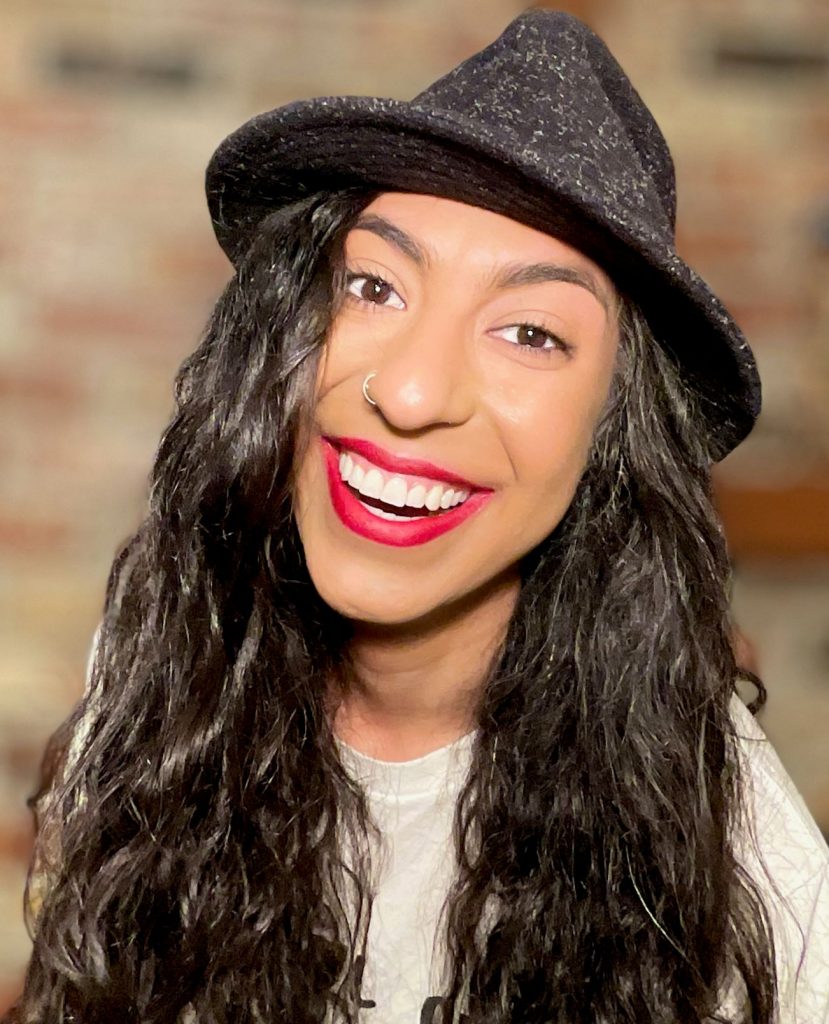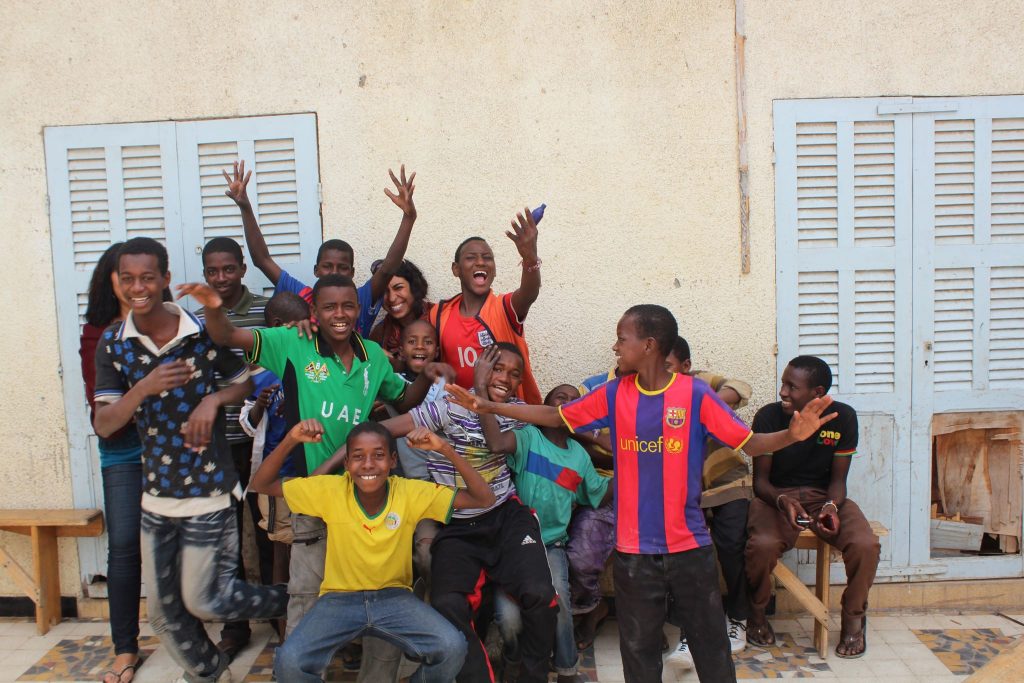A conversation with anti-oppression trainer Hadiel Mohamed
March 31st, 2022 | Careers, SIT Graduate Institute
During Women's History Month, SIT spotlights some of our extraordinary faculty, staff, and alumni across the globe who are making history today through their thinking, their words, and their actions.

As an Iraqi-American growing up in the predominantly white U.S. state of Idaho, it wasn’t until Hadiel Mohamed got to SIT that she found the support to explore her own identity.
“Going to SIT was the first time I got to go on an exploration of my racial identity and my lived experiences in Idaho, where I experienced racism and oppression but never had a teacher or family member or professor naming what I was going through,” says Hadiel, who completed her SIT master’s degree in Intercultural Service, Leadership, and Management in 2017.
Hadiel was among the last of the SIT Graduate Institute cohorts who did their full master’s degree programs on the SIT campus in southern Vermont. Today, full-time programs are taught at SIT centers around the world. Students in the hybrid programs come to Vermont only during the summer.
Hadiel’s exploration—the courses and conversations she shared with students and faculty on a remote Vermont mountain—set her on a path toward her current career as an anti-oppression trainer. We reached out to Hadiel to talk about the transformative work she does with individuals and organizations ready to make deep and meaningful changes. Following are excerpts from our conversation.
Please tell us about yourself—your background, what brought you to SIT, and ultimately to the work you’re doing.
My dad came to the U.S. on a student visa to Utah, where he studied horticulture. I was born in Logan, Utah, and when I was 2, we moved to Boise [Idaho]. I did undergrad in Idaho and then left for the Peace Corps in Senegal.
I was drawn to the Peace Corps mainly because I wanted to get involved in volunteer and international development. And in all honesty, Peace Corps is a semi-accessible way to get paid for that. It was a way to travel and do what my heart was leading me to do.
I was in Senegal for about four years; two years were in a small community doing whatever the community needed of me. Most of that focused on agriculture; there was some preventive health. I extended my service and the last two years were more impactful in shaping me as a human. I was in a larger city working with local activists advocating for young children who were being trafficked into the country.

I had learned Fulani, a minority language, but that’s not what was spoken in the city, so the kids became my translators. That was the most radical experience I had. It shaped my Peace Corps work because I was able to do what the children and local activists were asking without Peace Corps bureaucracy. It taught me that when ego drives us it’s not necessarily going to be what the people need.
Post Peace Corps we got a pamphlet with universities that have Peace Corps scholarships. SIT was listed on that. I knew the way Peace Corps did their language teaching, the immersive process, stemmed from SIT. I wanted to do grassroots organizing, so I was drawn to the concepts of immersive training and having this notion of understanding the community, being community-led.
Your website says: “In Vermont, I had the honor of learning and unlearning from practitioners who radicalized my critical race analysis and demonstrated the application of theory into practice.” Can you talk more about that?
SIT was a bubble in which I met some amazing humans.
There are very specific professors who really shaped me in the ways they held space in the classroom; Rachel Slocum was one. The Critical Race Theory weekend workshop she held for us shaped me. So many things she said I still carry to this day. We were unlearning things, and she had a way of calling us in, calling us forward. She would say, “What if it was this way instead?” And it was like: Oh my gosh!
I’m still holding onto the way these professors moved through the class, brought this radical imagination and implanted it within us.
Tats [Tatsushi Arai] was also that type of professor. The language he used was so intentional and meaningful. He would say, “One reason we don’t use the term 'black market’ is because of negative connotations. We say, ‘parallel economy.’”
I didn’t have classes with Mokhtar Bouba, but I still have conversations with him that leave me with my soul feeling so fulfilled. Jeff Unsicker was another. I’m still holding onto the way these professors moved through the class, brought this radical imagination and implanted it within us.
It was also the students. I have some of the greatest, most radical friends from SIT. I’m grateful that I got to do this in person; to have conversations until 3 a.m. in the cafeteria about things like how we could end racism in our communities. The ways we were able to engage is something difficult to replicate.
Ryland [White] is a huge reason why I’m at where I’m at; I took her Training Design for Experiential Learning course. From Paulo Freire’s banking concept to Kolb’s Learning Cycle, there was a lot of unlearning. A huge part of Ryland’s course was about training and facilitation. I still apply it to my everyday life, whether it’s a conversation with someone in a grocery store or a workshop with 40+ participants, facilitation skills are so important.
We were learning theory, but the professors are also practitioners, so they gave us real-life examples. You’ve heard of analysis paralysis, when people are so stuck on the theory that it holds them back from applying it. This wasn’t that.
How does your cultural background shape who you are today?
A huge, influential component for me is being a brown woman who grew up in Idaho, a predominantly white conservative state. It’s also what has driven me to do a lot of youth and education work; to emphasize the importance of having your identity validated in these spaces starting at a young age.
Whether it’s a conversation with someone in a grocery store or a workshop with 40+ participants, facilitation skills are so important.
Because they were from a country that was and is in conflict with the U.S., my parents definitely took on this approach of assimilation. We had our racial and cultural and ethnic identity, but it wasn’t explored, validated, or completely embraced because we had this fear, being in a predominantly white state.
Going to Senegal and seeing this beautiful country where people were being validated with their ethnic identities, experiencing so many of those cultural practices, made me yearn for exploring my own cultural practices. Going to SIT was the first time I got to go on an exploration of my racial identity and my lived experiences in Idaho, where I experienced racism and oppression but never had a teacher or family member or professor naming what I was going through.
Going on that journey made me realize that I don’t need to assimilate, I don’t need to fit in with whiteness. By exploring how to dismantle white supremacy I’ve found the passion to create spaces for educators, youth workers, teachers, and youth to feel empowered and validated for who they are.
You refer to your work as anti-oppression training and you seem to avoid what has become a popular acronym—DEI—diversity, equity, and inclusion. Can you explain why?
My separation from the term DEI comes from the fact that sometimes folks focus only on diversity: How can we bring people with different identities into a place that hasn’t done any of the work? In that way, you’re ultimately asking people to come into a place of harm. The retention rate isn’t high; the pay is still low; the policies are still oppressive; they’re dealing with racist comments from colleagues on a daily basis. It’s not a place where they get to feel celebrated. So, my qualm with the term is that it’s often not looking at the bigger picture.
By exploring how to dismantle white supremacy I’ve found the passion to create spaces for educators, youth workers, teachers, and youth to feel empowered and validated for who they are.
With inclusion, we’re trying to include people in a culture of white supremacy, and I don’t want to be included in that, I don’t want to replicate it. If we can dismantle that culture, we can build something so much better.
A lot of places approach DEI as a checked box: We did this training, now we’re good.
I don’t do a one-off anti-racism training; I find it harmful. Instead, I will lead multiple workshops and there must be co-created accountability: What will this look like for you to implement? How can you hold yourself accountable?
It’s not easy. Organizational shifts are huge. Not everyone is ready to embrace the journey.
Find out more about Hadiel's work on her website.
